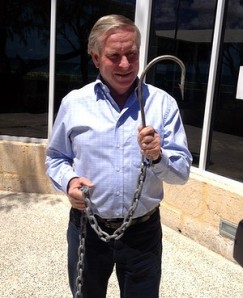Just before knock-off time last Friday, I received some inspiring news. It’s not often in conservation science that the news is good, so even small wins are deliciously welcome.
Unless you’ve been out bush for the last few days or completely ignored the news services, you would have heard that Western Australia has decided not to go ahead with its moronic shark-culling programme. It all came down to the Western Australia Environmental Protection Authority‘s recommendation to the state government that it should not proceed with the cull because of ‘uncertainties’ in its effectiveness and impacts. While the government could conceivably ignore this recommendation and go ahead with the cull anyway, the right-wing Premier of Western Australia, Colin ‘Captain Hook’ Barnett, stated that while he was “disappointed”, the government was unlikely to appeal the decision, at least this year.
Putting the obvious commentary on his response aside for the moment, this is a rare example where overwhelming evidence actually persuaded a semi-autonomous government agency from going ahead with clearly stupid environmental policies. I can claim a small part in this endeavour, having co-written the synopsis of the scientific consensus statement and co-signed the submission to the Environmental Protection Authority. However, it was mainly down to the hard work and dedication of Professor Jessica Meeuwig of the University of Western Australia that the Western Australia government had little choice to but to heed our condemnation. Without her, I can pretty much guarantee that the shark slaughter would be continuing this year.
As they say in France, “chapeau” to Jessica.
Contributors to ConservationBytes.com have previously argued that more advocacy by scientists is essential if we want to have any chance of limiting the anti-environmental sentiment now gripping many developed nations. Despite this clear victory for science and conservation, we have to remain vigilant about repeat proposals with little empirical support.
I also argue that it’s high time we turned our attention to the meshing and drum-line programmes in Queensland and New South Wales that have been indiscriminately killing sharks on Australia’s east coast for nearly 100 years. With this new Western Australia precedent, we have a much stronger basis with which to demonstrate their counter-productive policies.
Let’s keep the groundswell in motion and overwhelm the Queenland and New South Wales governments with evidence that shark meshing and baiting is an environmental travesty.




[…] and walk away. We might do a little more and shout our messages loudly from the media rooftops, or submit comments to proposed policies, or even draft open letters or petitions. Yet no matter how hard we seem to try, our messages of […]
LikeLike
[…] and walk away. We might do a little more and shout our messages loudly from the media rooftops, or submit comments to proposed policies, or even draft open letters or petitions. Yet no matter how hard we seem to try, our messages of […]
LikeLike
[…] Pimm, and Hugh Possingham. There are even others willing to go to extraordinary lengths to make an evidence-based protest against society’s more inane actions. I’ve said it before, but it bears repeating […]
LikeLike
[…] protected areas, piss-weak policies and a government at war with its own environment. Despite a few recent wins in marine conservation, Australia has a dreadful track […]
LikeLike
Well, as a European we always tend to think only the Japanese kill whales. No one ever tells us the Australians cull sharks or let them come to harm in nets. Although the latter is a different story than proactive culling. I presume, like with fishing nets in general, there might be solution that fulfills the meshes’ original purpose while making them safer for sharks?
LikeLike
Reblogged this on Wild Life and commented:
Some good news, expertly put by Corey Bradshaw…
LikeLike